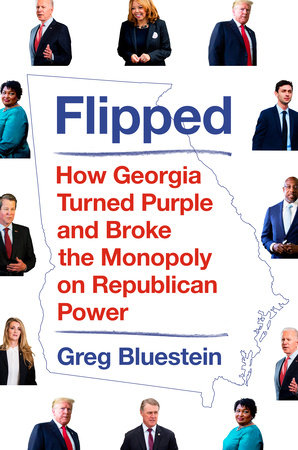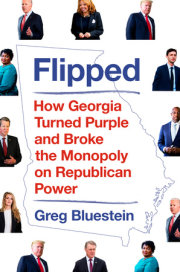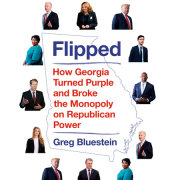Chapter 1
WTF Happened?
After President Trump's victory in 2016, Democrats in Georgia were angry-and ready to channel that fury into political energy. Georgia House minority leader Stacey Abrams had spent a lifetime preparing for just this moment.
The daughter of United Methodist ministers, Abrams grew up grounded in activism: she remembers boycotting a local Shell gas station as a child to protest the oil giant's ownership's ties to apartheid South Africa. As a teenager, she started a spreadsheet that meticulously charted each of her career goals, including a run for president as early as 2028. While a student at Spelman College, the famed historically Black institution in Atlanta, she led protests after the Rodney King verdict and challenged Atlanta mayor Maynard Jackson, the trailblazing first African American man elected to lead a major southern city, to work harder to help poor people of color. At Yale Law School, she worked at a legal clinic while writing the first of what would be a string of romance novels under a pen name. After a stint working for a prestigious Atlanta law firm and as a deputy city attorney, Abrams won a statehouse legislative seat and dedicated herself to becoming a political force-not by backslapping her way through the halls of Georgia's Gold Dome but by focusing on changing her party's direction from the inside out.
But if there was a defining story of her youthful foray into politics, it was the regretful high school trip to the Governor's Mansion for a reception for valedictorians. It was one she spoke about to friends in quiet moments and, later, on the campaign trail to roaring crowds. Her family's car had broken down before the dinner, and Abrams and her parents had to take a bus to the formal event in Atlanta's most elite neighborhood. While her peers drove up in expensive rides, Abrams and her parents walked the winding driveway to the big black gates surrounding the estate. When they arrived at the guard station, a security officer glanced at Abrams's mom and dad and then back at her. "This is a private event," she remembers him saying. "You don't belong here."
Abrams's incensed parents soon had him regretting his words with a tongue-lashing, and they were eventually allowed into the reception. But that moment from 1991 would be seared in her memory. She didn't recall meeting then governor Zell Miller that day or celebrating with other elite high school students from across Georgia. What she did remember was that an agent of the state attempted to block her entry to the Governor's Mansion by insisting that she didn't "belong" there.
In early 2017, she had that story in mind as she began putting the finishing touches on a soon-to-be-launched campaign to convince voters that she belonged in Georgia's top office. Over the past three years, she'd founded a voting rights group, the New Georgia Project, whose goal was to engage hundreds of thousands of voters of color disconnected from state politics. She built a national fundraising operation to promote her vision of liberal policies in the South. She helped transform her often-warring Democratic colleagues in the Georgia House into a more effective fighting force. And she assembled a team of aides and advisers to help burnish her national profile and not-so-quietly make senior party officials aware that she was running for governor-with or without their support.
To some in Georgia's political class, though, Abrams was known as a behind-the-scenes operator knowledgeable in the nuances of legislation and skilled at picking apart Republican talking points-and not as a fiery orator who could energize the masses. Sure, she had proven that she could impress wealthy donors in closed-door meetings. But many in Georgia were scarcely familiar with Abrams's name, let alone her ability to motivate Democrats.
While Georgia Democrats lacked a clear leader after years of demoralizing defeats, Abrams had been one of Trump's most outspoken critics in Georgia. His surprise White House victory gave her the chance she needed to funnel Democratic outrage into results-and cement her claim as the leader of the party's resurgence.
On a weekday afternoon in January 2017 in downtown Atlanta, not far from the spot where baseball legend Hank Aaron belted his 715th home run, a crowd of five hundred or so activists, politicians, and onlookers gathered at a union hall. A former beauty queen angling to run for office wore a sparkling sash. Haggard parents turned campaign leaflets into makeshift coloring books to keep their little ones occupied. Once and future candidates crammed into rows of plastic folding chairs arrayed under fluorescent lights.
A hush descended over the room as Abrams delivered her vision of how Democrats could win Georgia. Over the course of about fifteen minutes, she spoke of mobilizing liberals by promising expanded access to health care, promoting a more equitable economy, and a push to register, and then engage, overlooked Georgia voters. Above all, she made the case that Democrats could win back Republican-held territory if they embraced authenticity rather than set aside their priorities to try to win over wavering moderates. She wanted to be both a salve and a spark to angry, hurt, and frustrated Democrats; she promised them there was a tangible path to flipping Georgia, that resistance wasn't futile.
Like her or not, many of Abrams's fellow Democratic lawmakers saw her as a no-nonsense leader capable of navigating the messy mash-up of compromise and the shrewd triangulation of power under the Gold Dome. To her most loyal supporters, she was a prophet of voting rights, a visionary intent on building an ascendant political coalition with her promise of being an "unapologetic progressive." To her critics, she was a threatening new force in state politics whose promise to energize liberals could upend decades of a conservative-leaning status quo. But most hadn't seen her like this before: uncompromising, inspirational, and demanding. The audience, eager for a statewide standard-bearer in the Trump era, interrupted her speech frequently with applause and at the end rewarded her with a booming ovation.
The speech heralded some of the challenges that awaited Abrams as she rose in political stardom. An avowed introvert who once happily went to the grocery store and local haunts unrecognized, Abrams wasn't used to so openly wearing her heart on her sleeve. That day, in an aside, she said only half-jokingly that "if I could cry, I would"-a window into a no-nonsense and sometimes brusque style that had Democratic rivals whispering that she was the wrong fit for a party looking for a new champion.
As her message gained traction, it soon became clear that Abrams's political strategy would set Democrats on a course toward a new kind of battleground politics that would bring unprecedented spending, visits from a constellation of political stars, constant attention from national media, and a clash of ideologies between two parties diametrically opposed on most every major policy debate, each eager to use the other to energize their bases. As the audience trickled out of the union hall that day, many left confident that Abrams could awaken a dormant wing of the party.
There was, however, good reason to be skeptical. As 2017 dawned, Republicans controlled every statewide office in Georgia and both US Senate seats and enjoyed commanding majorities in the state legislature. Just a few years earlier, in the 2014 elections, a Republican ticket led by first-term governor Nathan Deal and Senate candidate David Perdue swept every statewide office easily, brushing aside younger, well-financed Democrats who had storied last names.
This had not always been the Georgia way. For most of the twentieth century, Democrats controlled every lever of power in the state with the unwavering support of rural white voters, stoked by crowd-pleasing populism, who backed segregationist and racist measures that disenfranchised Black residents. It was a monopoly built on a revulsion toward Reconstructionist policies promoted by Abraham Lincoln's Republican successors and, later, on the durability of Franklin Delano Roosevelt's New Deal coalition, one that united labor unions, poor white farmers, and minority voters.
Even as national Democrats championed civil rights legislation, partisans in Georgia and elsewhere in the "Solid South" mostly opposed the reforms, an agenda that helped them keep their grip on state power. Though their support might have seemed counterintuitive, Black voters reliably lined up behind Democratic candidates. Like its neighbors in the Deep South, Georgia was essentially a one-party state where victory in a Democratic primary was tantamount to election in November. To wield any sort of electoral power in Georgia, Black leaders had to wade into Democratic waters-or not bother at all.
Jimmy Carter came from that political tradition. He portrayed himself as a reliable southern conservative on his way to a gubernatorial victory in 1970 only to stun his supporters by delivering an inaugural address that demanded an end to racial discrimination in Georgia. He then remade his image into that of a moderate reformer who reorganized state government and appointed an unprecedented number of women and minorities to key agencies and judicial posts-a record he invoked during his triumphant 1976 run for president.
One of the first chinks in the state's Democratic armor emerged during Carter's doomed 1980 reelection bid, when he easily carried Georgia but was shellacked in much of the rest of the country. Bobby Kahn, then a young Carter staffer, left the president's election party in Atlanta about fifteen minutes after the polls closed, moribund over the White House defeat. But he drifted to sleep that night believing that at least Senator Herman Talmadge, the cigar-chomping, scandal-plagued four-term Democratic incumbent, would win. As he strolled to his law school class the next morning, a late run of The Atlanta Constitution declared Republican Mack Mattingly the winner. (An earlier edition of the paper inaccurately asserted that Talmadge "walks away with it.") Kahn, a stalwart Democrat who would go on to lead the state party, was astonished: "It was the wake-up call."
A wave of suburbanite returns that had streamed in overnight had won Mattingly, the Reagan revolutionary and woebegone chair of the state GOP, a seat as the first Republican elected to the Senate from Georgia since Reconstruction. His victory by just twenty-seven thousand votes exiled Talmadge, the hard-drinking scion of a political dynasty and self-proclaimed champion of the rural South, known to friends and foes simply as "Hummon."
Talmadge's loss also seemed to mark the start of a shift in power away from the countryside and toward metro Atlanta, where his opponent amassed a commanding edge. "Everyone sort of thought I was crazy," Mattingly later observed of his quiet eighteen months of campaigning. Everyone, that is, except the supporters who bought into his message of limited government, low taxes, strong military defense, and individual responsibility. So stunning was Mattingly's victory that newly elected president Ronald Reagan quipped to him: "Your coattails weren't long enough to drag me in" over Carter in Georgia.
But dreams of a Republican renaissance would be short-lived. Six years later, a congenial congressman and onetime Atlanta councilman named Wyche Fowler, known as the "night mayor of City Hall" for his owlish ways, rebuilt the Democratic alliance between rural white conservatives and Black voters in the cities to oust Mattingly. And the rise of Zell Miller, a bullheaded, mountain-bred college professor, arrested a broader GOP takeover with the help of far-reaching education initiatives that would forever change the state.
Frustrating his allies and enemies alike with diverging policy stances-he earned the derisive moniker "Zig-Zag Zell" early in his career-Miller was at times a liberal, a moderate, and a staunch conservative. His rivals griped that there wasn't a single position that Miller hadn't stood for at one time or another. "He wanted to ride a bicycle in a parade," former governor Lester Maddox once said of him, "but they wouldn't allow him because he was declared a danger with all his zigzagging all over the place."
He was also a shrewd tactician. After sixteen years as lieutenant governor, Miller was elected to the state's top job in 1990, defeating civil rights leader Andrew Young for the all-important Democratic nomination with a pledge to establish a state lottery to fund prekindergarten programs, technology improvements, and a college scholarship for students who maintained B averages.
He made good on the promise by signing into law the HOPE Scholarship, which has been responsible for sending more than 2 million students to colleges and tech schools. Weeks before his 2018 death, Miller told his former chief of staff Keith Mason at their final face-to-face meeting how proud he was that his legacy was still intact: "You know what I like about this lottery? It makes this old face still look new."
For a generation after Miller's stint as governor, Democrats ran on safeguarding and expanding the program. Before it had become a runaway success, Roy Barnes had hired a TV crew in 1989 to capture him delivering an anti-lottery speech from the Senate floor; when the smooth-talking trial lawyer ran for governor in 1998 after Miller's two terms, he pledged to expand the program on his way to a narrow victory.
By then, the Democratic coalition that had endured through much of the century was clearly starting to fray. Though Bill Clinton carried the state in 1992, Republican Bob Dole narrowly captured its thirteen electoral votes four years later. The growing Atlanta suburbs, filling in with newcomers with no allegiance to the Democratic Party, tilted increasingly toward the GOP. And hard-line conservative rural Democrats found themselves marginalized by the shifting leftward tides of the party in Atlanta and Washington. The revolution really took wings, though, when an irascible party-switching state senator named Sonny Perdue won an upset victory in 2002 to become the first Republican governor in Georgia since Reconstruction.
Perdue had given up his powerful job as the state Senate's second-in-command shortly after his father had suffered a grave heart attack. As he spent three weeks of soul-searching in an austere middle Georgia hospital room, watching his eighty-four-year-old father, a lifelong farmer, slip away, he challenged himself to look inward: "Are you going to do what's right in your own heart?" he asked himself. To Perdue, the honest answer to that question meant risking the power he'd accumulated in the legislature and switching in 1998 to the moribund Republican Party.
Quite quickly Perdue became a daily testament to what happened to Democrats who bolted the party: he was stripped of power and authority, lost his coveted committee assignments, and watched in vain as nearly every piece of legislation he hoped to pass was relegated to the dustbin. His time as a backbencher made him resolved to take on a bigger challenge, this time against "King Roy," the moniker he gave the supremely powerful Democratic governor. He had little else to lose, he reasoned, so why not take a shot at the highest office in the state?
Copyright © 2022 by Greg Bluestein. All rights reserved. No part of this excerpt may be reproduced or reprinted without permission in writing from the publisher.







